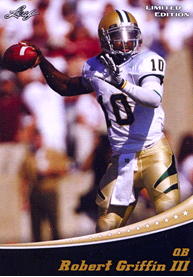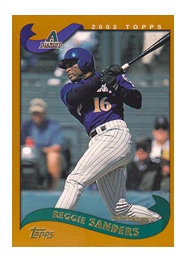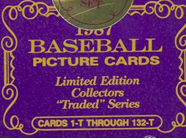
Law of Cards: Panini Battles for LIMITED Trademark
The process for getting a trademark registration is really a negotiation. First, the trademark owner files an application with the Trademark Office. Then the Trademark Office will likely reject that application (that's what they get paid to do, besides, the first rule of negotiation is that you never accept anyone's first offer). The trademark owner then argues that the Trademark Office is wrong and explains why, and/or will amend (legal translation: limit) the trademark application. The Trademark Office either will relent, or continue to reject the application.
Back and forth they go until the Trademark Office gives the trademark owner its registration, or the trademark owner gives up.
Panini's LIMITED trademark application is in the middle of that negotiation process now. As originally reported, Panini filed an application for the word mark LIMITED to be used with "trading cards." On its face, Panini filed this application to protect its LIMITED product line, which it launched in its current form in 2009.
The Trademark Office, however, did not like the application. Although Panini does have a product called LIMITED, the word "limited" is a descriptive term with a life of its own in the trading card world. Because of this, the Trademark Office reasoned it could not give a registration on LIMITED to just one trading card company.
Legal translation: If Panini had a registration for LIMITED, it could conceivably prevent others from using that term in association with trading cards.
This week, Panini continued the negotiation dance by filing its response. You be the judge if you think Panini's argument is good enough:
The mark LIMITED does not convey an immediate idea of sports trading cards. Upon reading or hearing the mark LIMITED, a consumer will not immediately connect the mark with Applicant’s goods. A consumer is left to the imagination before concluding the nature of Applicant’s goods and therefore the mark LIMITED is not descriptive, but suggestive.
Legal translation: Uhh, wait a second. If a consumer is a trading card collector (which is the proper starting point for the analysis), and hears or sees that a card or trading card product is limited, the first thought of that consumer is that the product has a small circulation/population. It's standard terminology. I guess this isn't a legal translation. It's a legal disagreement.
More interestingly, Panini then argues:
…Applicant and its predecessor are the only ones to have used LIMITED as a trademark for sports trading cards.
What? The only card company to have used LIMITED as a trademark? Seriously?
Sure, when there was a Leaf Limited product, Leaf was part of Donruss, which became Playoff, which became Panini. So Panini, conceivably, owned Leaf Limited then. But there is another new Leaf company out there. And while they don't have a LIMITED product, they do have cards that say "LIMITED EDITION."

I don't think they have a license from Panini, so that might (arguably) be another kind of Leaf Limited. OK, my head hurts from that.
But beyond Leaf Limited, there are other LIMITED products. For example, Upper Deck SP "Extra Limited" from 2002 (note the bottom corner).

Also in 2002, Topps released its LIMITED product in the form of a specially marked Tiffany-style factory set:

And really, the term "Limited Edition" is no stranger on trading cards of all types, including Topps Tiffany in 1987:

Even collectible card games like Star Wars Decypher have used the term:

The fact is, there are lots of trading card products that have referred to the term LIMITED in some fashion.
Guess that whole "Applicant and its predecessor are the only ones to have used LIMITED as a trademark for sports trading cards" statement is not 100% correct.
Sure, you can argue the cards above are not "trademark" uses, but that's a slippery slope, as Panini recognizes in the very next sentence of its response to the Trademark Office:
Applicant makes no claim that others should be precluded from continuing to use "limited" in a fairly descriptive sense, and indeed such usage is expressly permitted by Section 33(b)(4), 15 U.S.C. 1115(b)(4).
Legal translation: We'll let others use it in a "fairly descriptive sense" (whatever that means) just not in a trademark sense (again, whatever that means).
As you can see from above, quite a few of the products use the term "LIMITED" on the card itself. Is that a "fairly descriptive sense"? I doubt it. I think Panini means it'll allow its competitors to say, "These cards are limited in circulation" in advertisements, but you can almost bet if anyone prominently stamps the word LIMITED on a card, in any sense, if Panini owned LIMITED, it would be a big deal and I'd be writing about it in Law of Cards.
Given Panini's counterpoints to the Trademark Office, I think the negotiation is going to continue, and will result in Panini not getting a registration for LIMITED (unless, Panini somehow limits its LIMITED mark somehow).
But, you can't fault Panini for trying. Heck, I would have tried, too. Just think about what would happen if Panini did gain control of that word. Tt could prevent everyone else from using it with trading cards. It's worth the $10,000 or so to try and fight and get it.
An amusing thought: if Panini does get a LIMITED registration, the floodgates will open for trading card companies to file on other terms that most of us think are free for use. Maybe Topps can file for "Baseball Cards" or Leaf could file for "1/1" or every numbered combination out of 500 (1/500, 2/500, etc.) or Upper Deck can file for "hobby box." Unfortunately, they would have to, because if words like LIMITED can be removed from the trading card Lexicon, each company would have to file to protect the words that appear on their boxes and cards.
Hey, maybe someone can trademark those annoying patch disclaimers, "Although the piece of memorabilia contained in this card was likely from a clothing item that might have been a jersey, we can't tell you whether it was ever worn in a game, or even by the player pictured on this card."
You know, maybe we should trademark all of those phrases just to prevent the card companies from using them!
The information provided in Paul Lesko's "Law of Cards" column is not intended to be legal advice, but merely conveys general information related to legal issues commonly encountered in the sports industry. This information is not intended to create any legal relationship between Paul Lesko, the Simmons Browder Gianaris Angelides & Barnerd LLC or any attorney and the user. Neither the transmission nor receipt of these website materials will create an attorney-client relationship between the author and the readers.
The views expressed in the "Law of Cards" column are solely those of the author and are not affiliated with the Simmons Law Firm. You should not act or rely on any information in the "Law of Cards" column without seeking the advice of an attorney. The determination of whether you need legal services and your choice of a lawyer are very important matters that should not be based on websites or advertisements.
 | Making purchases through affiliate links can earn the site a commission |
































